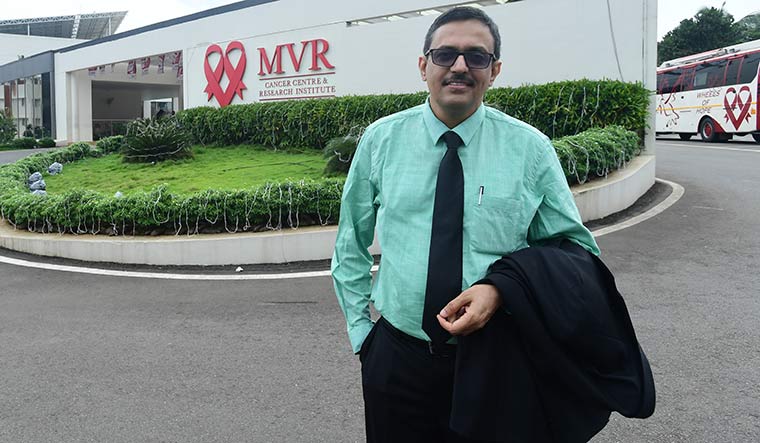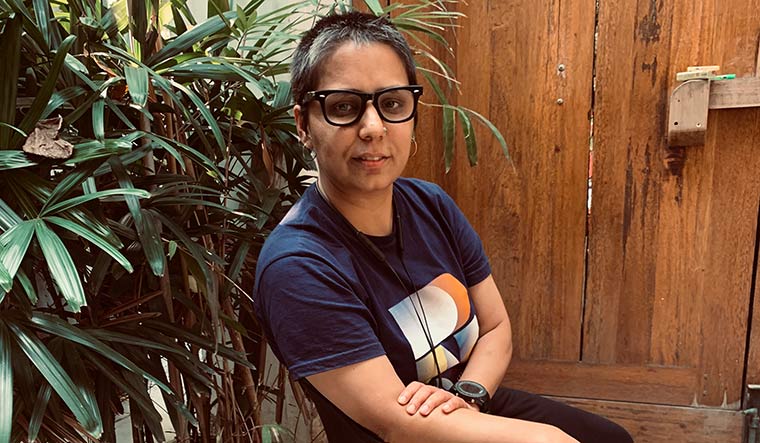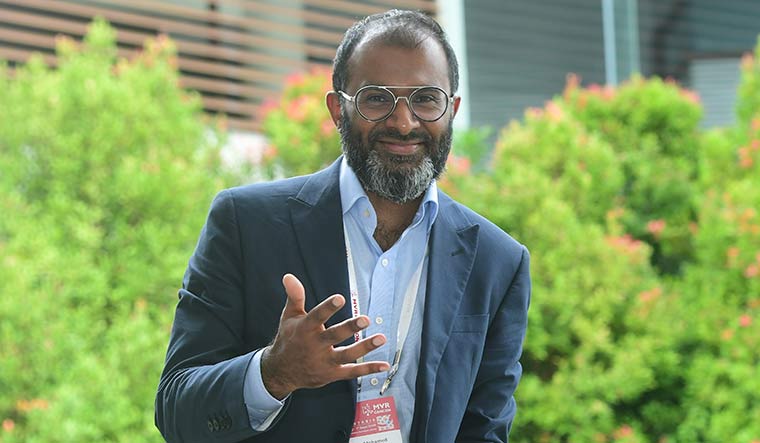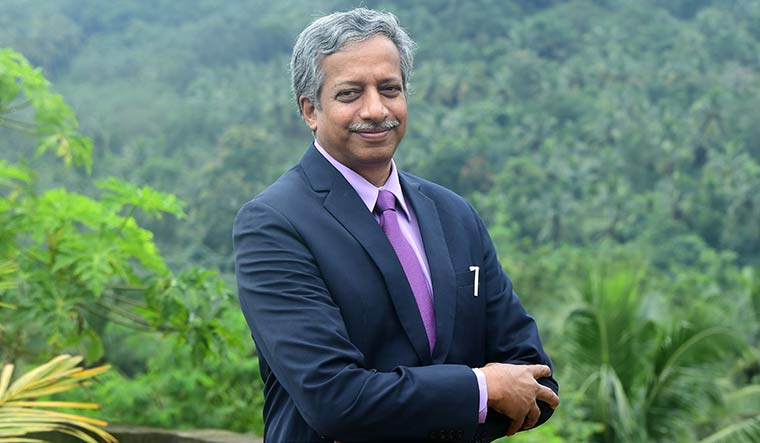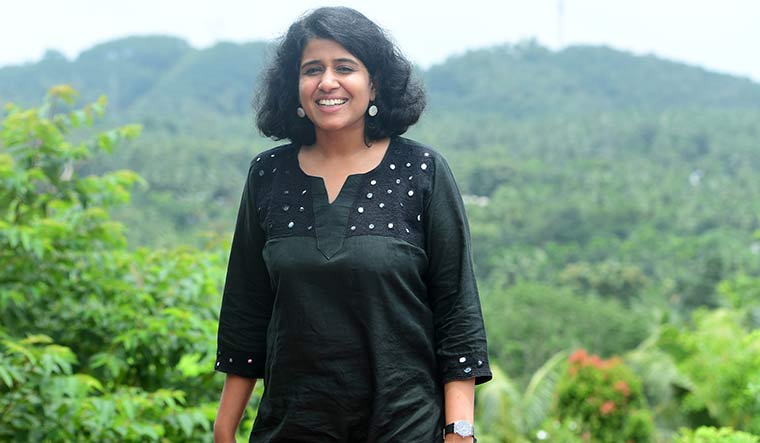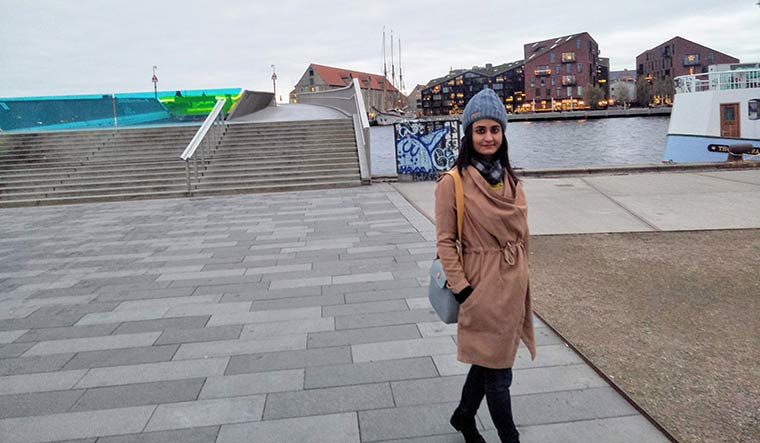Anupama Mishra from Mumbai sums up her CANCON experience as “revealing, enlightening and clarifying”.
Mishra’s mother has been suffering from metastatic breast cancer. The 43-year-old attended the conference to gain insights on advances in treatment. “It is important to know your enemy, not just in sports, business and workplace, but also while fighting cancer,’’ says Mishra, the lead singer in a music band.
CANCON is an annual conference on oncology conducted by MVR Cancer Centre and Research Institute (MVRCCRI), Kozhikode, Kerala. It attracts delegates from across India and countries like the UK and Japan. The conference has been truly transformational for many.
The three-day conference—August 30 to September 1—makes one see the cancer cell in a new light—apparently it is the most evolved and smartest organism on the planet. “We need to try to learn from the cancer cell. It is one step ahead of whatever we are doing,’’ says Dr K. Govind Babu, consultant medical oncologist at HCG Hospitals, Bengaluru.
This year, CANCON focused on metastatic cancer. Metastasis happens when a tumour spreads to a site or organ distant from its site of origin, says Dr Narayanankutty Warrier, medical director, MVRCCRI. “A tumour needs nutrition to be able to grow beyond 0.5cm. So, it produces its own blood supply. This process is called neovascularisation,’’ he says. Neovascularisation happens through growth of new blood vessels from major blood vessels near the tumour. “Once the tumour gets blood supply, it starts shedding cells into the blood stream,” says Warrier. “The tumour cells thus reach other organs, causing secondaries or metastasis.’’
Any tumour bigger than 0.5cm has the potential to metastasise. Normally, our body controls the division of cells, but malignant tumours have the ability to control their own division. They can either spread directly—the tumour will just grow and push into the next organ—or they can go through the blood stream or metastasise via the lymphatic system.
There are some tumours that are more likely to metastasise. “The more common tumours that are likely to affect us are the ones more likely to metastasise,” says UK-based Dr Faheez Mohamed, a general surgeon with special interest in peritoneal malignancies or cancers inside the abdomen. “For instance, bowel cancer, colon cancer, rectal cancer, which are increasingly common among the young population, are likely to spread to the lung and the liver.”
In the case of breast cancer, some patients have metastasis only to the lymph glands or bone, some will have it in the liver, abdomen, peritoneum and brain. ‘”Prostate cancer that is very common among men in the west also can metastasise. It can spread through the blood stream of the lymphatic system and then it gets to the liver, lung and the bone,’’ says Mohamed.
If diagnosed early, the chances of metastatic cancer would be very less, says Warrier. Ruchika Khanna, a metatstatic cancer survivor from Saket, New Delhi, learnt it the hard way. The 42-year-old squash player’s tryst with cancer began in 2015 when she found a small lump in her right breast. On further medical evaluation, she was diagnosed with stage 2 breast cancer. She underwent a surgery, followed by radiation and chemotherapy and was able to get back to her routine.
Three years later, when Khanna had pain in her left shoulder, she mistook it for a random sports injury and consulted a physiotherapist. The pain did not subside despite the physiotherapy. Subsequently, it spread from her left shoulder to the arm. “The pain was so bad that I couldn’t sleep for more than three hours,’’ she recalls. Khanna thought it could be a tissue or ligament tear. A visit to an orthopaedic expert, however, revealed a lesion in her left shoulder, and a PET scan showed two more lesions—one in the pelvic area and the other in the tailbone. “The cancer was caused by an underlying hormonal issue and the odds of recurrence of cancer was high. So, I had to have my ovaries removed,’’ she says. Khanna has been put on hormonal therapy and has now got back on court.
The general misconception of people is that once cancer spreads, it is not treatable. “But now quite a few of these patients can have a good [chance at] long-term survival and an excellent quality of life with treatment or one of the modalities like surgery, chemotherapy, radiation therapy, immunotherapy, targeted therapy or hormone therapy,’’ says Dr Sanket Mehta, consultant surgical oncologist, Saifee Hospital, Mumbai. “There are so many options within the field of oncology that can give good outcomes in stage 4 cancer.”
Two decades ago, Warrier treated a 26-year-old patient with cancer in his testes. The cancer had spread to his stomach, lungs and the brain. “His brother who accompanied him to the hospital had almost given up on him,” recalls Warrier. “I insisted he undergo treatment. I was so happy to hear from him recently. He told me he has two grownup children now. His voice brought back memories.”
The survival rate in metastatic cancer was less than ten months earlier. Today, patients live up to five years, says Babu. “One of my patients, a farmer, has finished his five-year followup. He is living normally, doing his work,’’ he says.
Mohamed says that a combination of chemotherapy, drugs and infusions into the blood stream along with surgery can give good outcomes for a range of cancers like bowel cancer, rectal cancer and for rare cancers such as appendix cancers.
But the road to conquering cancer isn't an easy one. Parul Thukral, 27, would know. The Delhi resident suffered from an aggressive, triple negative breast cancer that had spread to nearby lymph glands. The cancer made its presence felt with breast pain and mass. Thukral had severe pain as the tumour cells were multiplying fast. “The line of treatment adopted was chemotherapy first and then surgery followed by radiation, which were done one by one,’’ says Dr Ramesh Sarin of Indraprastha Apollo Hospital, New Delhi. Thukral and her husband decided not to have children as she was diagnosed with cancer. The couple was counselled to reconsider their decision. “It was ensured that chemotherapy did not destroy the ovarian germ cells,’’ recalls Sarin.
Every patient need not get chemotherapy, which has its own side effects. However, most patients with metastatic breast cancer are often treated with chemotherapy. “We are initiating a protocol in India as part of a global study to compare chemotherapy with hormonal therapy in premenopausal women with breast cancer, who are usually given chemotherapy,” says Babu. “This may help us to avoid chemo in these women and thus avoid some distressing side-effects.”
Oncology has seen exciting advances in recent times. A group of researchers in Israel has come up with a new ultrasound and freezing probe. The probe is inserted into the tumour, injecting it with liquid nitrogen solution and freezing it. “The tumour crystallises and the cells die,’’ says Babu, adding that this could be useful in oligometastasis, where the metastasis is limited to two or three sites.
Oncosurgery has evolved, too. In certain cancers, we have come a full circle, from the ultra-radical surgeries to the conservative ones. For instance, breast cancer treatment previously involved very aggressive surgeries like mastectomy. But now, there are breast-conserving surgeries. “However, in certain cancers like the colon cancer, we have gone from very limited surgeries to aggressive surgeries. Even in stage 4 cancers that spread to the peritoneum, liver or the lungs, we do multiple surgeries and achieve long-term survival,’’ says Mehta. Robotic surgery is coming up in a big way in India. “At the last count, I guess there were some 28 robotic installations in India,’’ he says.
Insights into which patient has a propensity to develop metastasis or not can be a game changer. “We are trying to see if we can pick up the circulating tumour cells and study them outside the body,” says Babu. “We will do drug testing and gene signature profiling so we can find out if the patient has a propensity to develop metastasis or not. If there is a propensity, we could perhaps have some intervention—use some particular drug to silence those genes to prevent metastasis.”
Advances in the treatment of peritoneal malignancies offer much hope to patients. Some peritoneal cancers can now be treated with radical surgery that comprises of completely removing the tumour combined with hot chemotherapy given directly to the peritoneal cavity—hyperthermic intraperitoneal chemotherapy (HIPEC). “Peritoneum is a thin layer that lines the inner side of the abdominal cavity and the organs contained in it like the liver, stomach and intestines,’’ explains Dr Aditi Bhatt, consultant, department of surgical oncology, Zydus Hospital, Ahmedabad. Generally, cancer spread to the peritoneum is considered stage 4 cancer, and the person affected may survive for a few months to a couple of years with chemotherapy.
“Cancers arising from the appendix and some cancers of the peritoneum have been treated with HIPEC with great success,” says Bhatt. “Recently, a benefit of HIPEC has been shown for patients with advanced ovarian cancer and those with stomach cancer. This treatment can enable these patients to live a long and normal life.”
Namrata Raha’s story is full of unexpected twists and turns. The 37-year-old from Ranchi had a giant cell tumour in her right hand that progressed to bilateral lung metastasis. “Initially, in 2005, it was just a tumour in the middle finger of my right hand that kept reoccurring, and ultimately my finger was amputated,” she says. Raha was fine after her finger was amputated in September 2008. “But we were never told that it could spread to other organs,’’ says Raha. “I wish my doctor back then had advised me to get a chest X-ray so as to keep a tab on the disease's progression.”
One rainy night in September 2010, Raha vomited blood. “It was very traumatic as doctors from a leading private hospital took ten days to diagnose my problem and in the process also did a surgery that could have been easily avoided,” she recalls. In the following months, at a different private hospital, Raha had open surgeries on both sides of the lungs and more than 40 tumours were taken out from each side. Fortunately, they were benign. “I think the fact that I met the right doctor in S.M. Shuaib Zaidi [of Indraprastha Apollo Hospital, Delhi] was critical and lifesaving. I would not have lived to marry and have a blissful life, had it not been for him,” she says.
Raha lost a bit of her lung mass, and her recovery time was almost six months. Initially, she had to get a scan done every three months; today it has become a once in a two-year ritual. “Mine was not a case of cancer, but yet I think it is very important that you stick to the regime of followup even after recovery and stay in touch with your doctor because cases like these need to be very closely observed for several years,” she says. “Also, I think trying to stay positive is helpful in recovery. It is not always possible but there is not an equally good second option to help yourself.”
Delayed diagnosis is one of the major challenges in India’s battle with cancer. “Around 60 per cent of breast cancer patients in India come with cancer that has spread from the breast to the armpit area. Distant spread of the disease is found in 20 per cent of the patients at presentation,’’ says Dr N. Aditya Murali, consultant, medical and haemato-oncology, Aster CMI Hospital, Bengaluru.
Late diagnosis increases the mortality associated with metastatic cancer. In western countries, thanks to the screening programmes, breast cancer is detected early, while it is confined to the breast. By the time Lata Janardanan sought treatment, she had a fairly advanced form of breast cancer with a lump in the breast. On further investigations, it was found her cancer had spread to the lymph nodes and also to one of the backbones. The 50-year-old special needs teacher based in Bengaluru had HER2/neu mutation, a gene mutation that causes breast cancer to present at multiple sites at the same time. Around 20 per cent of breast cancer patients have this mutated gene, which can be turned off with medications. Janardanan was treated with chemotherapy, targeted therapy and radiation to the backbone.
Cost is a major factor why metastatic patients don’t usually follow up. Once a patient is diagnosed with cancer, insurance companies deny them coverage. Experts say that it makes sense for people who are genetically predisposed to cancer to invest in a health insurance policy. MVRCCRI, in association with the Calicut City Service Cooperative Bank, has come up with the City Care Scheme, in a bid to provide affordable cancer care and treatment for all. Those who deposit Rs10,000 in the bank will get lifelong cancer treatment coverage of up to Rs5 lakh, provided they have not been diagnosed with cancer at the time of joining the scheme. Anyone can join this scheme and avail free treatment up to the age of 70.
Khanna had health insurance while she was diagnosed with cancer. However, only half of her treatment expenses were covered by her policy. “Despite having health insurance, only half of my expenses were covered during surgery, radiation and the tests stages. Rest was all paid by me,’’ she says. The entire expense of hormonal therapy was also paid by her.
Despite hurdles, Khanna's strong will made the journey of treatment much easier, says Dr Harit Chaturvedi, chairman, Max Institute of Cancer Care, Delhi. Cancer has been a life changing experience for her. “It can be a great motivator that constantly reminds you to do things you love right now than later,”says Khanna. “It makes you realise the fragility of life—that nothing can be taken for granted. Every morning I wake up, I thank God for letting me experience yet another day. That is, in its own way, a beautiful experience. And I am glad that I am able to fight it till now.’’ Cancer also made her realise that no matter how busy our lives are, we must find time to listen to our bodies and prioritise that over everything else. “Always believe you are much bigger and stronger than the disease itself,” she says. “Half your battle is won then.”
Some names have been changed.




